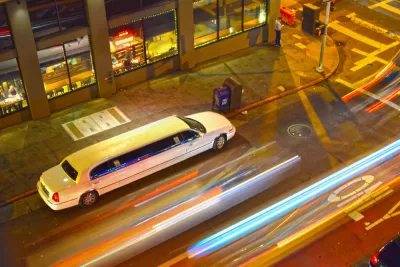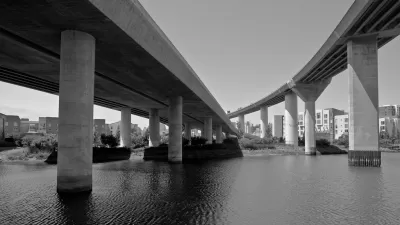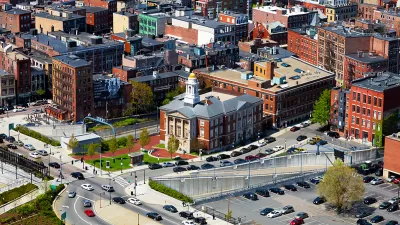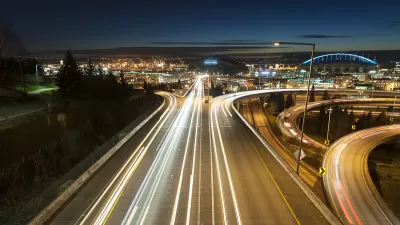Only a handful of cities in North America are considering applying tolls to congested urban streets, as opposed to highways. Efforts in one of those cities, San Francisco, just received negative polling results on a potential $3 auto access fee.

Urban or cordon tolling has proven to be effective in large cities in Europe and Asia, but has yet to gain a toehold in North America, though some major cities, such as Vancouver, Seattle, Los Angeles, New York and San Francisco, are considering it.
Joe Fitzgerald Rodriguez, who covers transportation for the San Francisco Examiner, reports that "support for congestion pricing downtown among San Franciscans is nearly as low as it can get, according to a city poll released Tuesday."
The Dignity Healthy CityBeat poll [pdf] from the San Francisco Chamber of Commerce revealed only 16 percent of San Franciscans strongly support charging a $3 fee to people driving in and out of downtown during commute hours.
On the flipside, 51 percent of respondents strongly oppose the plan, with 14 percent “somewhat” opposing the plan, and 14 percent “somewhat” supporting the plan. All told, that’s 30 percent of San Franciscans backing the idea, and 65 percent rejecting it.
However, congestion pricing advocates should not be discouraged. The results are a tad better than those reported by The Seattle Times Traffic Lab last month on a similar type of cordon toll plan, which found that only 26 percent of city residents supported a downtown access charge for motor vehicles. The proposal, included in the April 2018 Seattle Climate Action plan [pdf] unveiled last April by Mayor Jenny Durkan, is one of many strategies used to meet a 2011 goal of having the city achieve carbon neutrality by 2050. See page 14:
Improving mobility through pricing:Announce that the City will develop and release a strategy to address congestion and transportation emissions through pricing, coupled with investments in expanded transit and electrification in underserved communities.
Notwithstanding the lackluster support for cordon tolling, "the Board of Supervisors, acting in their capacity as the San Francisco County Transportation Authority board [on Tuesday], authorized $500,000 to further study the concept in San Francisco," notes Rodriguez. The budget request for the Downtown Congestion Pricing Study begins on pg. 57 of 71 in the Transportation Authority's Prop K/Prop AA Allocation Request Form [pdf].
Referencing low support in the CityBeat poll, Supervisor Rafael Mandelman said instituting the scheme would be “a heavy lift.”
“I think there is inherent concern and doubt about this approach,” he said, while acknowledging it is “one of the few tools we have left” to combat downtown traffic congestion is congestion pricing.
Tilly Chang, executive director of the Transportation Authority, tweeted that "the [San Francisco] chamber has asked this question every year since we at @sfcta first studied congestion charges in 2010, however, their poll question leaves out mention of the many significant benefits (reduced congestion, improved transit, safer streets and lower emissions)."
Indeed, a review of Planetizen's congestion pricing archives finds "The Case Against San Francisco's Congestion Pricing Plan," December 24, 2008:
In this San Francisco Chronicle op-ed, "San Francisco is not London", Steve Falk, the CEO of the S.F. Chamber of Commerce, explains why London-style congestion pricing is inappropriate for the downtown core - that it would only hurt businesses without reducing congestion.
A decade later, the group remains convinced that a downtown access toll would be bad for business, a far cry from the position of the Partnership for New York City, which represents that city’s business leadership. On Feb. 7, the group announced support for cordon pricing "to fund modernization of the subway, bus and commuter rail system and to ensure that New York remains a thriving global city,” said Kathryn Wylde, President & CEO.
As for the funding source for the study, the Transportation Authority's Prop K webpage states that it is "a half-cent local sales tax for transportation that was approved by San Francisco voters in November 2003 that is used to fund everything from signals to streetcars, bicycles to boulevards, and pedestrian safety improvements to paving."
Hat tip to The Bay Link.
FULL STORY: Polling show SF residents reject congestion pricing proposal

Alabama: Trump Terminates Settlements for Black Communities Harmed By Raw Sewage
Trump deemed the landmark civil rights agreement “illegal DEI and environmental justice policy.”

Study: Maui’s Plan to Convert Vacation Rentals to Long-Term Housing Could Cause Nearly $1 Billion Economic Loss
The plan would reduce visitor accommodation by 25% resulting in 1,900 jobs lost.

Planetizen Federal Action Tracker
A weekly monitor of how Trump’s orders and actions are impacting planners and planning in America.

Wind Energy on the Rise Despite Federal Policy Reversal
The Trump administration is revoking federal support for renewable energy, but demand for new projects continues unabated.

Passengers Flock to Caltrain After Electrification
The new electric trains are running faster and more reliably, leading to strong ridership growth on the Bay Area rail system.

Texas Churches Rally Behind ‘Yes in God’s Back Yard’ Legislation
Religious leaders want the state to reduce zoning regulations to streamline leasing church-owned land to housing developers.
Urban Design for Planners 1: Software Tools
This six-course series explores essential urban design concepts using open source software and equips planners with the tools they need to participate fully in the urban design process.
Planning for Universal Design
Learn the tools for implementing Universal Design in planning regulations.
Caltrans
Smith Gee Studio
Institute for Housing and Urban Development Studies (IHS)
City of Grandview
Harvard GSD Executive Education
Toledo-Lucas County Plan Commissions
Salt Lake City
NYU Wagner Graduate School of Public Service





























